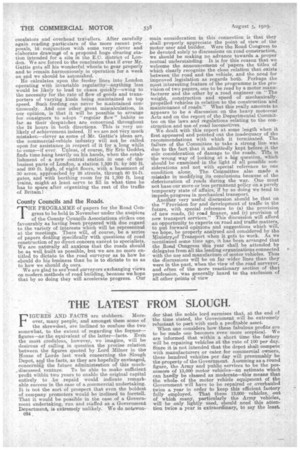County Councils and the Roads.
Page 2

If you've noticed an error in this article please click here to report it so we can fix it.
THE PROGRAMME of ,papers for the Road Congress to be held in November under the auspices of the County Councils Associations strikes one favourably as having been prepared with due regard to the variety' of interests which will be represented at the meetings. There will, of course,. be a series of papers dealing specifically with questions ef road construction of no direct concern excent to specialists. We are naturally all anxious that the roads should be a,s, well built as possible, but we are no more entitled to dictate to the road surveyor as to how he should do his business than he is to dictate to us as to how we should de ours. We are glad to ,seeroacl surveyors exchanging views on modern methods of road building, because we hope that by so doing they will accelerate progress. Our main consideration in this connection is that they shall properly appreciate the point of view of the . motor user and builder. Were the Road Congress to be devoted solely to discussions on road construction, -we' should be making no advance towards a proper mutual understanding. It is for this reason that we welcome the announcement of "papere the titles of which clearly recognize the close relation that exists , between the road and the vehicle, and the need for improved legislation as regards both. Perhaps the most interesting feature of the programme is the provision of two papers one to be read by a motor manufacturer and the other by a road engineer on "The weight, construction and speed of mechanicallypropelled vehicles in relation to the construction and maintenance of roads." What this really amounts to appearsto be a discussion on the heavy motorcar Acts and on the report of the Departmental Committee on the laws and regulations relating to the construction and use of road locomotives. We dealt with this report at some length when it first appeared and pointed out the inadequacy of the recommendations with which it terminated. The failure of the Committee to take a strong line was due to the fa.et that it admittedly kept before .it the sole consideration of damage to the roads. This is the wrong way of looking at a big question, which should be examined in the light of all possible considerations and not with special reference to one condition 'alone. The Committee also made a mistake in modifying its conclusions because of the deterioration of roads 'during the war. One must not base our More or less permanent policy on a purely temporary state of affairs, if by so doing we tend to impede-progress in mechanical transport. Another very useful discussion should be that on the "Provision for and development of traffic in the future, with special reference to (a) the provision of new roads, (b) road finance, and (c.) provision of new transport services." This discussion will afford an opportunity to experts on road and traffic matters, to put forward opinions and suggestions which will, we 'hope, be properly analysed and considered by the Minietryeof Transport when it gete to work. As we mentioned some time ago, it has been arranged that -the Road Congress this year shall be attended by delegates from all the leading organizations connected with the use and manufacture of motor vehicles. Thus the discussions will be on far wider lines than they were in the past, when the view of the road surveyor, and often of the more reactionary section of that profession, was generally heard to the exclusion of all other points of view






















